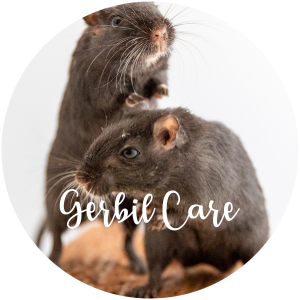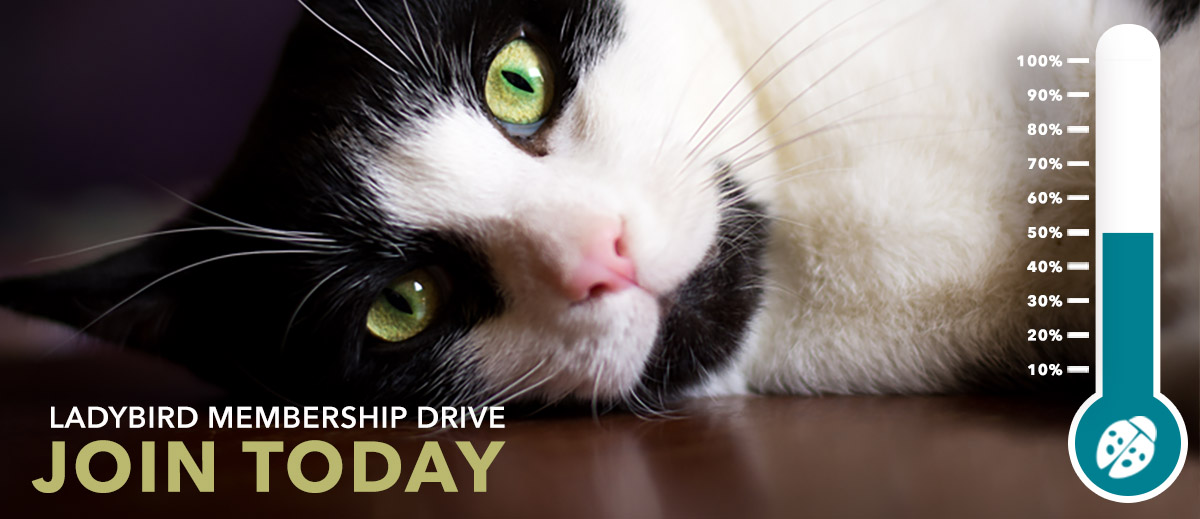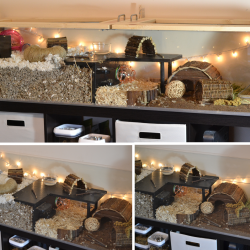Gerbil Care

Your Guide to Caring for Gerbils
Gerbils may not be as common a pet rodent as hamsters, but get to know one (or ideally two!), and you will find they are friendly and fascinating animals. Gerbils are energetic pets who require an attentive, consistent guardian.
- Curly-photo by Trevor Weeks
- Larry-photo by Trevor Weeks
- Moe-photo by Trevor Weeks
Before you bring your new companions home, though, you need to know what to expect from living with gerbils. Gerbils behave a lot like wild gerbils. And two things are very important to wild gerbils: security and companionship.
Security
Gerbils are a prey species. In the wild, they are always on the lookout for predators – on the ground and in the air. Gerbils thump to warn others about danger. Other gerbils listen in and either thump back in response or flee to safety. They dash into a complex network of underground tunnels and dens that make up the burrow where they live. As pets, they do the same. To feel secure, your gerbils need to be able to dig – and retreat to – their own system of rooms and passageways.
- Fred and Barney – photo by Luca Simpson
- Sunflower and baby
Companionship
Wild gerbils live in large family groups. Together in their underground home, they sleep, play, stash food, eat, raise families and groom each other. Another way they communicate is by scent marking. They have a special gland on their stomach that they rub over things to let other gerbils know they were there. Gerbils also mark each other to create a “family scent.” Pet gerbils are social too! Gerbils should not be kept alone. Two can live together provided they are the same sex and have a large enough living space. For all those hours people are at work or school (or asleep), think how happy your gerbil will be having a gerbil friend! They’ll eat, play and sleep together, and groom each other. To help prevent squabbles, gerbils kept in pairs should come from the same litter or be introduced to each other when they are very young. Never keep male and female gerbils together, even for a short period. Gerbils multiply at an amazing rate. Females can have up to 12 litters in just one year, with anywhere from one to eight young per litter. Consider adopting more than one gerbil so they can keep each other company when you’re not home.
Drink Up!
Gerbils need water available to them all the time. Fill your gerbils’ water bottle with clean, fresh water every day. Once a week, clean the bottle using soap and water. If you prefer to use a water dish, be sure to keep it high on a platform in the enclosure. Gerbils tend to bury things as they dig, creating a soggy mess.
- Sage
- Diesel
- Barney – photo by Luca Simpson
Chow Down
Being omnivores, gerbils eat both plant and animal products. Feed your gerbils a staple diet of gerbil specific rodent seed mix and rodent blocks. Provide a small amount of vegetables, fruits, nuts and seeds every day, too. Gerbils crave variety! Be sure to remove any uneaten fresh food the next day so it doesn’t spoil and make them sick.
Gerbils love treats! Foods such as unsweetened cereals, plain popcorn and cooked pasta make great snacks. Just don’t feed too many or you’ll end up with fat, unhealthy gerbils!
- Hamster or gerbil enclosure
- Hamster or gerbil enclosure
- Hamster or gerbil enclosure
A Clean, Comfy Home
Gerbils are active animals requiring a large habitat. Each gerbil needs at least one square foot of space to himself. The more space, the better! Gerbils are burrowers so a deep enclosure with a solid bottom is best. A 50 gallon aquarium with a wire mesh lid would be a wonderful enclosure for a pair of gerbils. Unlike wire cages, aquariums keep the bedding from flying all over the place as gerbils dig. And, unlike plastic cages, aquariums can’t be chewed through! Be sure to get a secure wire lid to prevent escape. For bedding, use wood shavings such as aspen, shredded paper or CareFRESH® (bedding made from recycled paper). Do not use cedar or pine shavings because they can cause health problems. Provide a deep layer of bedding to allow your gerbils to burrow, and watch your gerbils get busy creating tunnels and racing through them. As desert animals, they produce dry feces and very little urine, so aquariums only need to be completely cleaned out about every three to four weeks. Keep the cage in an area protected from cold drafts and direct sunlight, as well as bright lights and loud noises.
Adding cork logs, chew toys, cardboard, ramps, tunnels, tubes and a solid (not wire) exercise wheel provides stimulation and places to hide and sleep. Swap items in and out to keep your gerbils’ cage interesting.
If you’re looking for something a little different than an aquarium, Niteangel makes a fantastic line of cages and accessories that cover all the bases as far as appropriate items for hamsters and gerbils.
Another alternative is the “Ikea Hack” cage.
- Good wheel
- Bad wheel
- Good wheel
Getting Their Steps In!
Gerbils require daily exercise, and a wheel is a must. The wheel must be large enough that the gerbil does not have to bend their back while they run. Wire wheels are not a good option due to potential injury with caught limbs.
Plastic exercise balls are definitely not recommended. They are known to open unexpectedly, leading to escape, and they are a danger to a gerbil’s physical and mental health. Gerbils will happily explore a playpen made just for them. A wading pool or a bathtub (drain closed!) lined with a towel works well. Fill with safe objects to climb on, over and through to keep your gerbils busy and interested. Paper bags, cereal boxes, paper cups, toilet paper rolls and untreated wood are good choices. Always supervise playtime.
Handle With Care
You can pick up your gerbils by putting cupped hands near them and letting them crawl into your hands. Be careful not to squeeze! Hold your gerbils while sitting on the floor. Not all gerbils enjoy being held and they may try to leap from your hands. Never pick a gerbil up by his tail. Part of his tail could actually fall off – ouch! Broken tails don’t grow back.
Spa Treatment
Gerbils are great groomers. They spend lots of time each day carefully cleaning themselves – and each other – all over. Provide your gerbils with a sand bath – a glass jar tilted on its side, or a shallow dish will work. Put in a layer of two to three tablespoons of appropriate sand. A good brand is Zoo Med ReptiSand. Although it’s labeled for reptile use, it is good quality sand that is also suitable for rodents. Use a small strainer daily to clear out any bedding, food, and poop that may end up in the bath area.
My, What Big Teeth You Have!
To help wear down their ever-growing front teeth, provide your gerbils with chewing items such as cardboard, Timothy hay, wooden toys and apple or aspen branches. Make sure the branches come from trees that haven’t been treated with any chemicals.
Keeping Healthy
Spending time with your gerbils will show you how they normally look and behave. When you notice something unusual – like diarrhea or loss of appetite – you’ll know to take them to the veterinarian right away! Not every veterinary clinic offers specialized care for small animals like gerbils. Gerbils require a vet who has the expertise to properly treat “exotic” pets to give them the best care possible.
Gerbil adopters should already have a vet picked out who has the knowledge to care for their new friend – be it for a general health check, or an emergency.
We’ve compiled a list of vets in the Hamilton and surrounding area that we have either used ourselves, or confirmed that the clinic has a vet on staff who is trained in small animal care.
For further research,
check out these YouTube channels:

Adopt gerbils today!
Sources:
Text – excerpts of “Caring for Gerbils” by BC SPCA
Photos – Gerbils rescued by Ladybird Animal Sanctuary




























